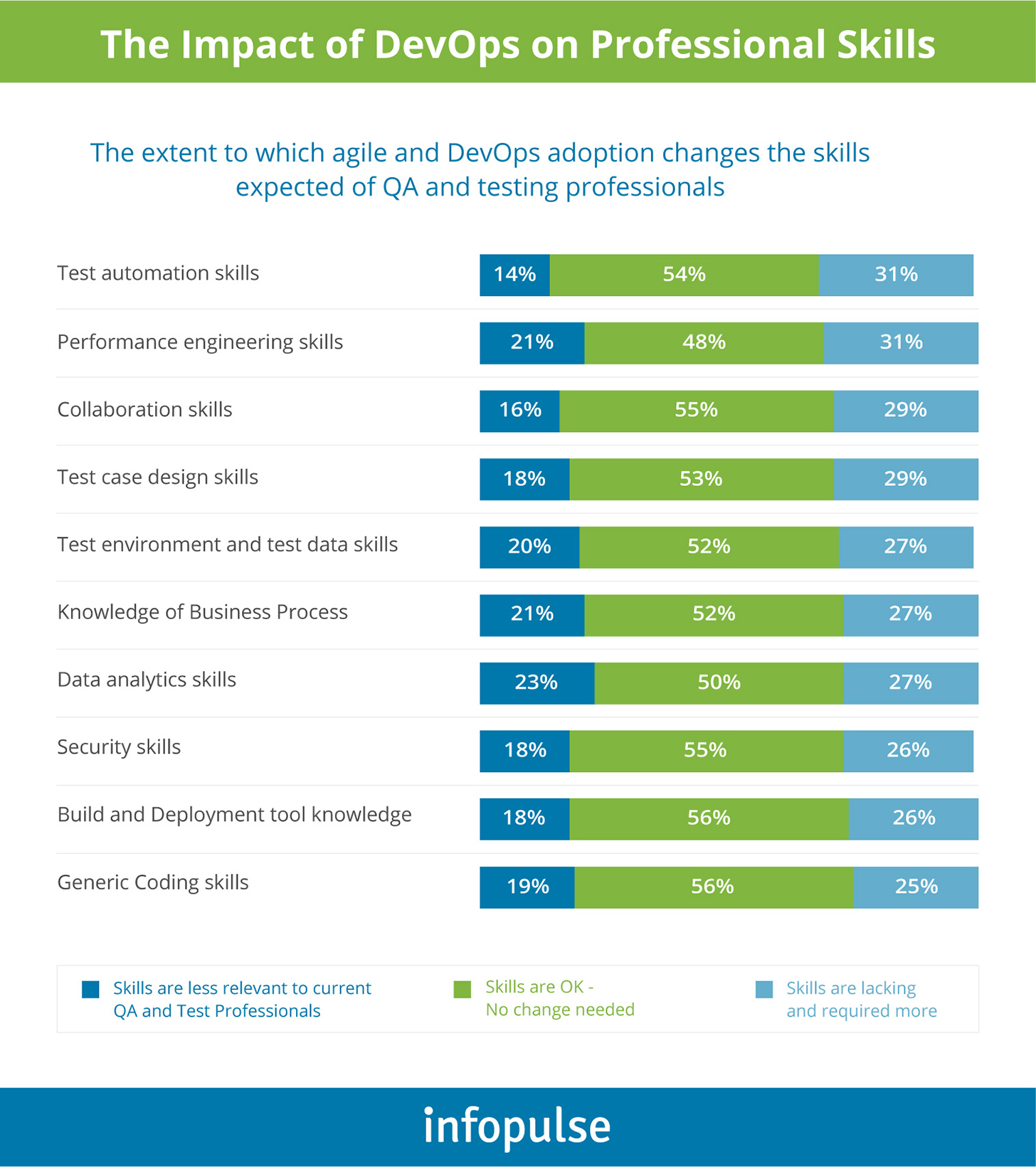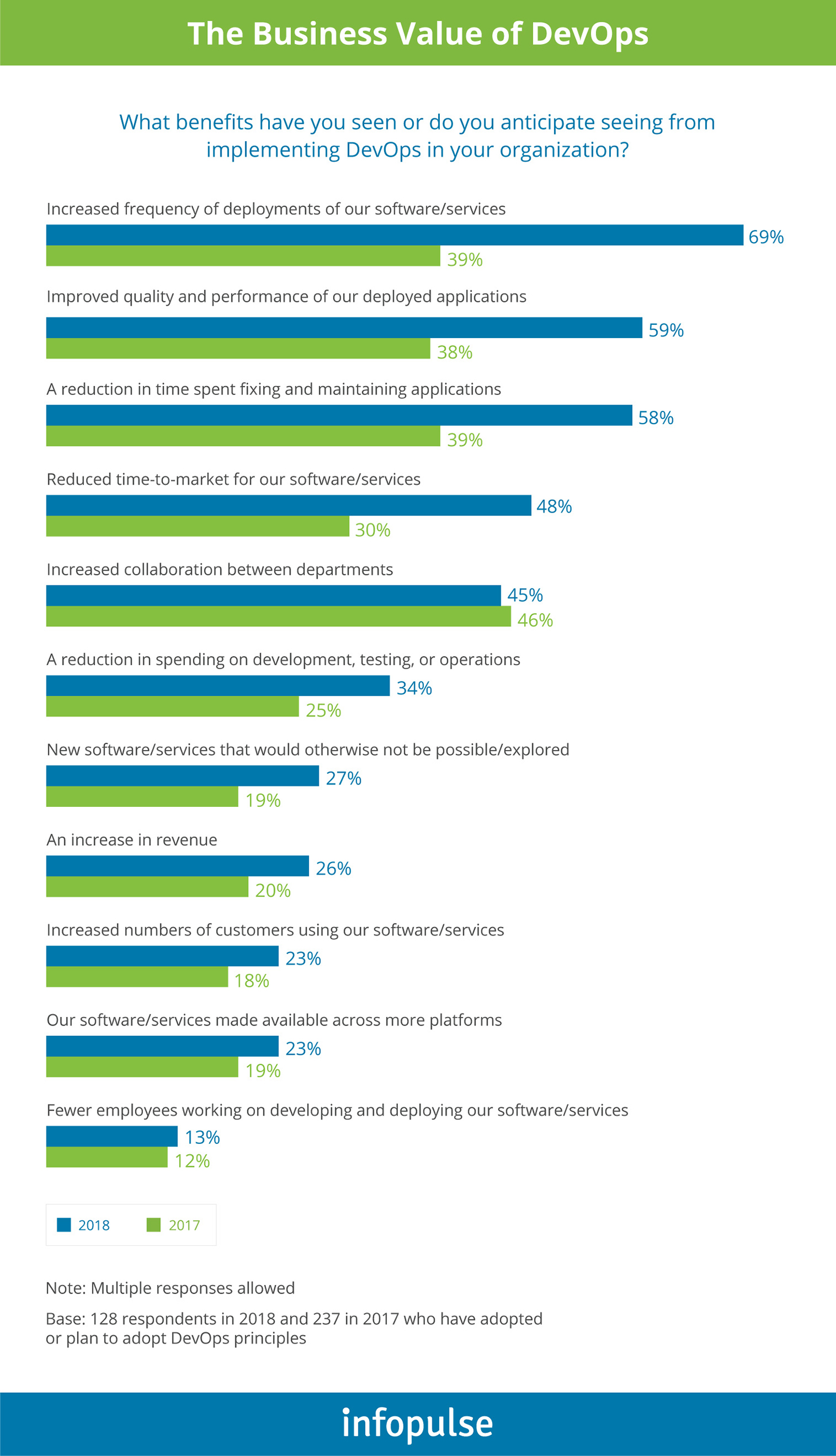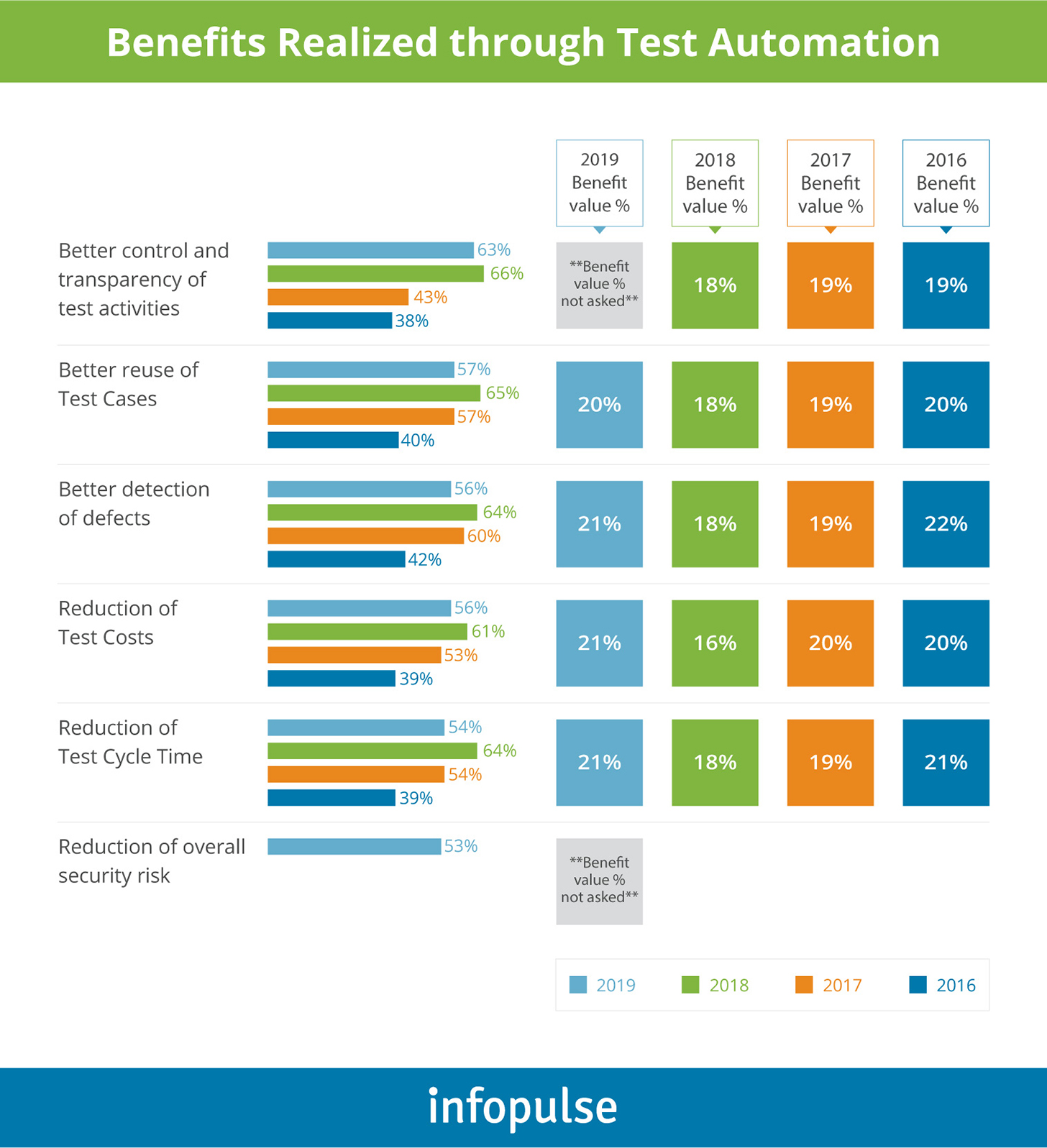6 Reasons Why QA Outsourcing and DevOps Implementation Make Sense
When it comes to digital products, CX directly correlates with the code quality – a factor impossible to achieve without a proper QA process in place. Still, as Gartner research indicates: “Most organizations take too long to change, test and release enterprise business applications for business use.” And require even more time for customer-facing products.
Several factors contribute to the absence of proper QA processes:
- Low tester to developer ratio within the company
- Lack of professional niche and full-stack testing expertise
- Inability to adopt test automation at sufficient levels
- Lack of appropriate test environment and test data
- Difficulties in identifying the core areas where the tests should focus
Can ‘traditional’ QA outsourcing – one that involves shifting all the QA activities in bulk to an external vendor – solve all of these issues? Probably, not. However, adopting a more integrated approach and seeking out a partner that has both DevOps and application testing expertise can make a tangible impact on your product delivery lifecycle.
Thus, if you are wondering why to outsource QA activities and what’s the best way to approach this process, here goes your data-driven answer.
The Top 6 Benefits of Outsourcing QA to an Agile Vendor
When it comes to product quality, one of the key DevOps pillars is the following:
Such a paradigm largely redefines the role of QA:
- QA teams are responsible for quality tracking across the entire development cycle. Their goal is to identify issues not only in the software, but also in the delivery process itself, and proactively recommend improvements whenever possible.
- Usage of automation testing is mandatory to support frequent releases. In fact, any testing that can be automated should be automated.
- Software testers act as product quality advocates and, thus, continuously try to find and report new ways of improving repeatability and predictability in development.
Now keeping the above points in mind, let’s zoom in on how outsourcing QA to the right vendor can help you transform your product and process quality.
1. DevOps Enablement
According to the World Quality Report 2019-2020 by Capgemini, one in four respondents are struggling to adopt Agile and DevOps due to other operational and business priorities.
Indeed, allocating sufficient IT resources for this strategic change can be challenging, especially if most of your teams are working at full capacity to support business-as-usual. However, staying with a siloed development/testing structure isn’t an option either, as such an approach means that both of your teams are working on optimizing subcomponents rather than pursuing a larger goal of improving user and customer experience.
At the same time, the Capgemini report indicates that most organizations lack as much as 30% of key testing skills required for successful practicing of agile development. What’s more – hiring full-stack testers remains a challenge.

Settling for continuous testing and subsequently DevOps over traditional software QA outsourcing, you can break away from the crippling slow testing process and enable your organization to move much faster without compromising the product quality or ballooning your QA budgets. Plus, this lets you fill in the capacity gaps with the right testing talent.
Learn more about DevOps from our additional materials:
- [Blog] What Is DevOps and Its Business Benefits
- [Blog] The Basic Concepts of DevOps for Businesses
- [Case Study] Irish State Agency: DevOps Leads to 6X Faster Release-to-Production Time
- [Case Study] Custom Cloud/DevOps Solution Saved a Client €80+ Million in Infrastructure Costs
- [Whitepaper] DevOps on Azure: Leverage the Best of Both Worlds
2. Reduced QA Costs and Time
Traditional software testing can eat up to 30-40% of an application’s budget. A decision to outsource automated QA testing can reduce that figure by 4X to 5X times as automation testing can majorly expand test coverage at the same cost, plus gain additional ROI from earlier defect detection and fixes.
DevOps, which may be introduced along with the delivery of QA outsourcing services, can subsequently lead to the following benefits:

Furthermore, this Puppet’s State of DevOps 2019 report also indicates that high DevOps maturity and security integration can significantly improve your company’s cybersecurity posture and save your company from hefty fines for data breaches.
3. Access to Niche Testing Skill Sets
IoT, AI, ML, and predictive analytics pilots are moving from the margins to the mainstream cross-industry. These innovations increase the complexity of new deployment and, thus, extend the release cycles. Furthermore, such innovative applications also command niche QA talent.
In 2018, Capgemini first reported on the increased need for new testing roles – AI QA analysts and test data scientists. Both of these roles will only grow in importance throughout the 2020s as AI/ML deployments pick up speed. And so does the hiring competition for such talent.
A partnership with one of the QA outsourcing companies, in this case, could help you avoid the costly hiring overheads. Moreover, such partnerships can provide you with access to the right QA skills on-demand, meaning that you can switch between different pilots and use cases at a faster pace.
4. Higher Level of QA Automation and Access to the Latest Tools and Frameworks
Intelligent testing automation, powered by robotic process automation (RPA), model-based testing (MBT), and UI automation testing, is replacing the standard manual practices (though, manual testing has its merit too!).
Having said that, most enterprises are still struggling to switch to at least basic automated testing. Capgemini survey respondents indicate that the following factors prevent them from introducing a greater degree of automation:
- Challenges with test environment and data availability/stability
- Lack of skilled testing automation specialists
- Insufficient test automation tools to meet the current needs
Choosing to outsource software QA to a vendor, experienced both in automation and DevOps, can help your company simultaneously fill the gaps in tools and talent, plus implement a larger scope of workflow changes that would improve the speed, efficiency, and coverage of your tests. As a result, you can attain the following benefits of automated testing:

5. Proactive Risk Identification and Risk Sharing
Apart from wiring additional quality into your software products, experienced QA specialists will also proactively seek and report issues that may result in data privacy and compliance breaches within your application.
Furthermore, by partnering with an outsourcing QA software testing service provider, your company also shares the Operational & Technical risks with the vendor.
Operational risks can result in system failures and ineffective processing, hampering your operations. An experienced QA team can conduct a comprehensive risk analysis before starting the project. And, later, continuously help identify and mitigate the root causes of software testing failures such as:
- Suboptimal or conflicting testing priorities
- Insufficient resources allocation
- Gaps or conflicts in test coverage
Technical risks can lead to major functionality and performance failures is another area that a QA outsourcing vendor can proactively oversee and report when:
- Continually changing requirements are sabotaging the test results
- Lack of technical resources leads to subpar coverage
- Product complexities can extend the time and scope of required tests
- Current code quality can majorly sabotage further development
For instance, under the Agile testing framework, a QA team, together with the developers, sets a tolerance threshold for the number of issues that can be present in one user story. Once testers discover that critical volume of issues, they inform the Dev team, and all further development gets halted until the present issues are resolved.
Having such a setup simultaneously:
- Prevents deployment of half-done features
- Reduces the volume of reported, yet unresolved bugs, at the end of the sprint
- Minimizes the risks of releasing new features that contain obvious and/or critical issues.
And that’s just one quick example of how continuous testing can minimize product risks.
6. Higher Objectivity
Last, but not least, comes the interesting factor of objectivity. External consultants and QA specialists can give a more holistic assessment of your current code quality, SDLC, and overall software development standards.
Having someone zoom in into your team’s work can help you uncover:
- Common inefficiencies and opportunities for automation
- Extra cost-savings via infrastructure optimization
- Skills gaps preventing your teams from writing better code
- Operational and workflow bottlenecks
- Gaps in collaboration and knowledge sharing among teams
- Other areas of inefficiencies, preventing you from achieving higher delivery speed and product quality
To Conclude
Having the right QA outsourcing partner on board can lead to major transformations in your software delivery lifecycle. By opting for an integrated approach to testing, backed by a high degree of automation and other DevOps best practices, your company can achieve that high bar of continuous quality and deliver reliable, predictable, and delightful products to your end-users.

![Pros and Cons of CEA [thumbnail]](/uploads/media/thumbnail-280x222-industrial-scale-of-controlled-agriEnvironment.webp)
![BPO in Telecom and BFSI [Thumbnail]](/uploads/media/thumbnail-280x222-ways-business-process-outsourcing-bpo-can-help-telecom-bfsi-and-other-industries-advance.webp)
![Cloud-Native Maturity Model Assessment [thumbnail]](/uploads/media/thumbnail-280x222-what-Is-the-cloud-native-maturity-model-definition-and-assessment-criteria.webp)
![Power Platform for Manufacturing [Thumbnail]](/uploads/media/thumbnail-280x222-power-platform-for-manufacturing-companies-key-use-cases.webp)

![Containers vs VMs for Microservices [thumbnail]](/uploads/media/thumbnail-280x222-containers-vs-vms-what’s-better-for-microservices.webp)
![Accelerated Development with Azure DevOps Toolset [thumbnail]](/uploads/media/thumbnail-280x222-how-to-improve-developer-velocity-with-azure-devops.webp)
![10 Lessons Learned: AWS Migration [Thumbnail]](/uploads/media/thumbnail-280x222-10-lessons-learned-on-aws-migration.webp)
![Cloud FinOps Implementation Roadmap [Thumbnail]](/uploads/media/thumbnail-280x222-cloud-finops-why-you-need-it-and-how-to-get-started.webp)
![Challenges of Low-code vs Custom [TN]](/uploads/media/thumbnail-280x222-how-to-overcome-the-challenges-of-low-code-and-custom-solutions-development-expert-advice.webp)